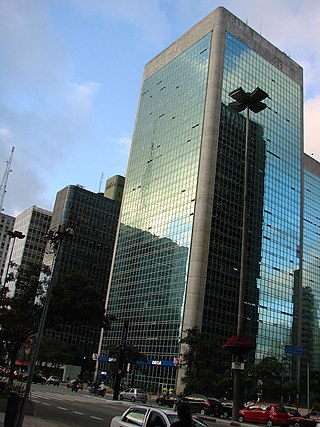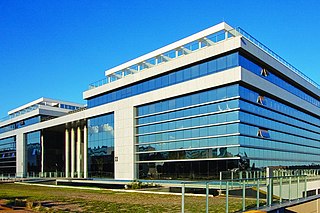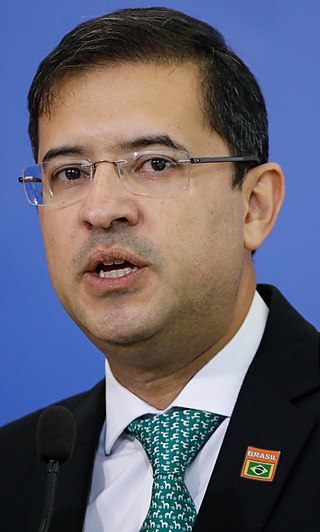
Afonso Augusto Moreira Pena,often referred to as Afonso Pena,was a Brazilian lawyer,professor and politician who served as the 6th president of Brazil from 1906 until his death in 1909. Pena was elected in 1906,the chosen successor of president Rodrigues Alves. Pena was the first politician from Minas Gerais to win the presidency,ending the series of São Paulo politicians who had held the presidency since 1894. Before his presidency,he served as the 4th Vice President of Brazil under Rodrigues Alves (1903–1906) after the death of Silviano Brandão. Pena was a monarchist. He was the only member of Emperor Pedro II's cabinet to become president of Brazil and the first Brazilian president to die in office.

Aécio Neves da Cunha is a Brazilian economist,politician and former president of the Brazilian Social Democracy Party (PSDB). He was the 17th Governor of Minas Gerais from 1 January 2003 to 31 March 2010,and is currently a member of the Brazilian Chamber of Deputies. He lost in the runoff presidential election against Dilma Rousseff in 2014.

The Federal Supreme Court is the supreme court of Brazil,serving primarily as the country's Constitutional Court. It is the highest court of law in Brazil for constitutional issues and its rulings cannot be appealed. On cases involving exclusively non-constitutional issues,regarding federal laws,the highest court is,by rule,the Superior Court of Justice.

The law of Brazil is based on statutes and,partly and more recently,a mechanism called súmulas vinculantes. It derives mainly from the European civil law systems,particularly the Portuguese,the Napoleonic French and the German.
Same-sex marriage has been legal in Brazil since 16 May 2013 in accordance with a decision from the National Justice Council,ordering notaries of every state to license and perform same-sex marriages. Brazil became the second country in South America to legalize same-sex marriage nationwide,after Argentina,and the twelfth worldwide to do so.

Lesbian,gay,bisexual,and transgender (LGBT) rights in Brazil rank among the highest in the world. Same-sex couples in Brazil have enjoyed the same rights guaranteed to heterosexual ones since 16 May 2013,including marriage and adoption. On June 13,2019,the Brazilian Supreme Court ruled that discrimination on the basis of sexual orientation and gender identity is a crime akin to racism.

In Brazil,the Federal Constitution establishes eight law enforcement institutions - seven titulars and one auxiliar. The titular institutions are:the Federal Police,the Federal Highway Police,the Federal Railroad Police,the Federal Penal Police,the State Military Police and Fire Brigade,the State Civil Police and the State Penal Police. Of these,the first four are affiliated to federal authorities and the latter three are subordinated to state governments. These public safety institutions are part of the Executive branch of either federal or state government. Apart from these eight institutions,there are others which affiliate to municipal authorities:the Municipal Guards. According to Minister Alexandre de Moraes of the Supreme Federal Court,"...the Municipal Guards are inserted in public safety as the auxiliary and related body of public security force..." Federal law 13,022 gave them de facto and de jure police attributions.

Santa Rita do Sapucaí is a municipality situated in the southernmost part of the State of Minas Gerais. The city is known as the "electronic valley",since it has plenty of electronic industries,and both a technical school and a University which hold courses in electronic knowledge. It also has another university –FAI,which has majors in administration and informatics.

The Regional Federal Courts are the courts of appeal in the Federal Courts of Brazil,the second instance courts of the Brazilian federal justice system,responsible not only for appeals of trial court decisions,but also for writs of security,habeas corpus,and habeas data against acts by federal judges,motions to set aside judgments,criminal revisions,and conflicts of jurisdiction.

The National Council of Justice (CNJ) is an administrative and oversight organ of the Brazilian Judiciary created by constitutional amendment in 2004 as a part of judicial reform. Among its responsibilities are ensuring that the judicial system remains autonomous,conducting disciplinary proceedings against members of the Judiciary,and compiling and publishing statistics on the Brazilian court system. The Council has nationwide jurisdiction over all courts except the Supreme Federal Court,but makes no rulings on cases and does not review judgements of other courts. Its fifteen members are chosen by the Supreme Federal Court for two-year terms.

The Judiciary of Brazil is the group of public entities designated by the Brazilian constitution to carry out the country's judicial functions.

Anti-discrimination laws in Brazil are present in the Constitution of Brazil,in the labour law,in the child and adolescent law,in the ageing law,and in the penal code.

The Brazilian Election Justice was created by Decree No. 21,076 of 24 February 1932,representing one of the innovations of the Brazilian Revolution of 1930. In 1932 the first edited Brazilian election code was passed. It was inspired by the election justice of the Czech Republic and the ideas of Joaquim Francisco de Assis Brasil,a politician,farmer and ambassador.
The Canecão Mineiro nightclub fire occurred on 24 November 2001 in Belo Horizonte,Minas Gerais,in southeastern Brazil,killing 7 people and injuring 197 others. The fire was caused by pyrotechnics set off on the stage.

Leonardo Nemer Caldeira Brant is a Brazilian jurist and International law scholar. He serves as judge of the International Court of Justice since 4 November 2022. He is also a professor at the Federal University of Minas Gerais (UFMG) and the founder of the International Law Center (CEDIN),in Belo Horizonte.

Events in the year 2020 in Brazil.

JoséLevi Mello do Amaral Júnior is a Brazilian jurist. He has a career as Attorney for the National Treasury,as an acclaimed legal expert and professor and held the office of Attorney General for Brazil and Acting Minister of Justice and Public Security between February and March 2017,after the nomination of former minister Alexandre de Moraes to the Supreme Federal Court. He was also Attorney General for the National Treasury and is a licensed professor at the Law School of the University of São Paulo (USP).

Events in the year 2022 in Brazil.

Alexandre Silveira de Oliveira is a former police chief,businessman and Brazilian politician,affiliated with the Social Democratic Party (PSD). He was a senator for Minas Gerais.















